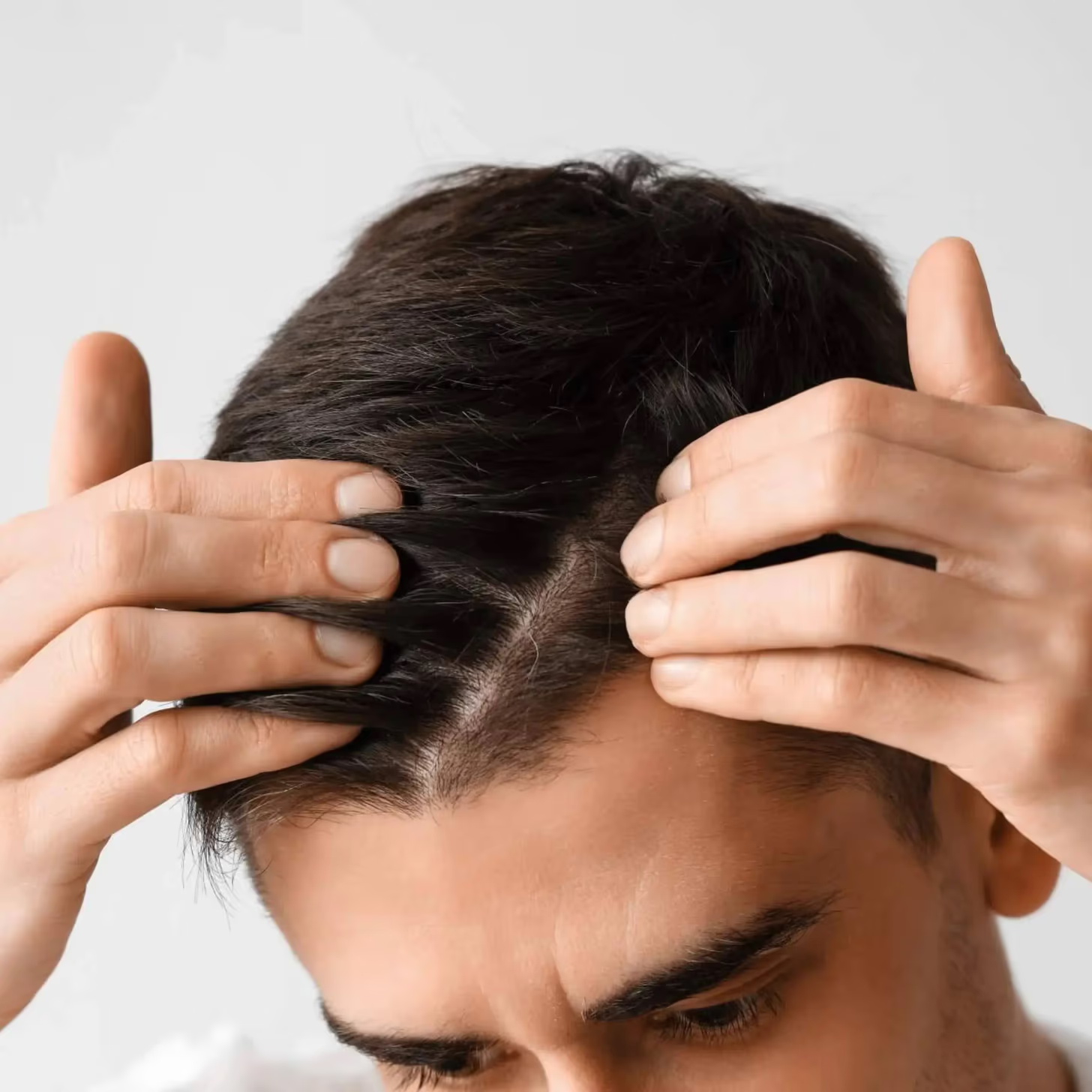Hair Transplant: The definitive solution for hair loss
Surgery duration
5 - 7 hours
Anesthesia
Local
Postoperative rest
Ambulatory
Visible effects
10 months
Recovery
3 days
Results
Life-long
We are not a franchise
We have our own medical team
What is a hair transplant?
A hair transplant is an effective solution for those wishing to restore lost hair and improve their appearance naturally. With advanced techniques, this treatment ensures long-lasting results, minimal invasiveness, and a quick recovery. It is an excellent choice for those looking to restore their confidence and enhance their aesthetic in the long term.
How is the procedure performed?
The hair transplant procedure involves moving hair follicles from a donor area (usually the back or sides of the scalp) to areas where hair has been lost. Several techniques are employed, but the most common are the Sapphire FUE technique, which makes incisions and covers large areas, and the DHI FUE technique, which implants follicles directly without cuts, making it ideal for areas with some existing hair. Both options effectively restore lost hair and provide durable, natural results, improving the aesthetic for those suffering from alopecia or hair loss.
Sapphire FUE Technique
Ideal for advanced alopecia cases, this technique allows for up to 3500 follicular units to be transplanted. It is mainly used to cover areas without hair, making precise incisions with sapphire blades. Implantation is done using tweezers (TTC), offering greater precision. After the procedure, scabs form but disappear within 7 to 10 days. This technique is ideal for large areas due to its ability to cover extensive regions effectively.
DHI Technique
More suitable for small cases or density improvement, this technique involves transplanting up to 2500 follicular units and is perfect for areas with existing hair. It uses an implanter pen operated by the surgeon to implant follicles directly without making cuts, making it less invasive. No scabs form, though mild redness may appear and fade quickly. This method is more subtle and clean, ideal for enhancing hair density in areas with some growth.

Ideal Patient
A hair transplant is ideal for:
- Individuals with healthy donor areas where hair continues to grow normally.
- Men and women experiencing androgenetic alopecia (genetic hair loss) or hair loss due to factors such as trauma or burns.
- Patients with realistic expectations about the process and results.
- Individuals with stable hair loss, meaning they do not experience accelerated hair loss.
Preoperative tests for hair transplant
To ensure optimal results, the following steps are recommended:
- Medical history: Review of health, hair loss history, and expectations.
- Scalp examination: Evaluation of the amount of hair and selection of the appropriate technique.
- Blood tests: Detection of nutritional deficiencies or health issues.
- First consultation with the surgeon: Explanation of the procedure, risks, and post-surgery care.
Following these recommendations will optimize results and ensure a safe, effective experience.

Postoperative care after hair transplant
To ensure the best results after a hair transplant, follow these care guidelines:
- Rest and care for the area: Swelling and redness are normal initially.
- Medical follow-up: Attend periodic check-ups to assess healing and progress.
- Medications: Take antibiotics or anti-inflammatories as prescribed.
- Hair care: Avoid washing hair in the first few days and use recommended products when you do wash it.
By adhering to these guidelines, you will encourage fast recovery and successful results.
Improves hair density
Natural appearance
Boosts self-esteem
Minimal scarring
What is the price of a hair transplant?
The cost of a hair transplant varies depending on several factors, such as the technique used (Sapphire FUE or DHI), the number of follicles to be transplanted, and the clinic performing the procedure. On average, prices range from €2,500 to €8,000, depending on the complexity of the case.
Factors affecting the price of a hair transplant
- Number of follicles to transplant: The more follicles required, the higher the cost.
- Technique used: Different techniques (FUE, FUT, DHI) may have varying prices.
- Procedure duration: A longer procedure generally increases the cost.
- Materials and technology Used: Advanced technology or specific materials can affect the price.
- Postoperative Services: Some hair transplant packages include follow-up and post-surgery care, increasing the total price.

Where can I get a hair transplant?
At EGOS, we offer hair transplant procedures at multiple locations, making it easy to access the treatment nearby.
Frequently asked questions about hair transplant surgery
How long does it take to see the final result of a hair transplant?
The transplanted hair growth becomes visible around 3 months, but the final result is usually seen between 6 and 12 months after the procedure.
How long do the results last?
The transplanted hair is permanent. It is an autograft that will retain all the characteristics of the donor area.
Are multiple sessions required?
Sessions will vary depending on the type and degree of alopecia. For small areas of alopecia, a single session will be sufficient; for larger areas, between two and three sessions may be needed. The time between sessions will be determined by the patient.
Is special care required?
Once the hair has grown, it behaves the same way as it did originally.
Does the hair transplant leave scars?
In the case of the FUE technique, scars are minimal and almost imperceptible, while the FUT technique may leave a more visible scar, although it is usually hidden under the hair.
Does the hair transplant procedure hurt?
The procedure is performed under local anesthesia, so the patient does not feel pain during the surgery. It is normal to experience some discomfort or sensitivity in the days following the procedure.
What should be avoided after a hair transplant?
It is important to avoid direct sunlight, intense physical exercise, and the use of chemical products on the hair during the first few weeks. Additionally, the patient should follow the doctor's instructions regarding hair washing and care for the treated area.
Can more than one hair transplant be performed?
Yes, it is possible to undergo more than one hair transplant if necessary. Some people require more than one session to achieve the desired result, depending on the extent of hair loss.
What are the risks associated with a hair transplant?
The risks associated with a hair transplant include:
- Infection: As with any surgical procedure, there is a risk of infection in the areas where the hair follicles have been extracted or implanted.
- Swelling: Swelling is common in the forehead or scalp in the days following the procedure.
- Bleeding: Mild bleeding may occur in the treated areas after surgery.
- Scars: While the hair transplant usually leaves minimal scarring, there is a risk of visible scars, especially if the technique used is not appropriate.
- Loss of sensation: It is possible to experience a temporary loss of sensation in the treated area, which typically recovers over time.
- Hair loss (shock loss): It is possible for the transplanted hairs to fall out temporarily before starting to regrow, which is a normal part of the process.
- Unsatisfactory result: There is a risk that the results may not meet expectations in terms of density or distribution of the transplanted hair.
Can a hair transplant be performed on people with advanced alopecia?
Yes, but the results will depend on the density and quality of the donor area. In some cases, it may be necessary to combine treatments to optimize the results.
What happens if I don’t have enough hair in the donor area?
In these cases, other donor areas, such as the beard or chest, can be considered, although these options have limitations.
When can I wash my hair after the transplant?
Generally, you can wash it with specific products and gently starting from the second day, according to the clinic’s instructions.
Is it possible to combine the hair transplant with other treatments?
Yes, treatments such as PRP (Platelet-Rich Plasma) or medications like minoxidil and finasteride can complement the transplant and stimulate hair growth.
Can I wear a cap or hat after the procedure?
Yes, but it is generally recommended to wait a few days and ensure that it does not put pressure on the treated area.

Related Treatments for Hair Transplant Surgery
Our hair transplant team

Dr. Holidey Cano
What motivates me most in this specialty is seeing how my patients regain their natural appearance without looking artificial or forced. With careful attention to the design of the hairline and the distribution of grafts, I ensure that the new hair grows in a harmonious way, blending seamlessly with the facial features and respecting each person’s individual style. The key to my approach is to make sure my patients feel renewed after the treatment while staying true to their essence.
More information
Cristina Alcaraz
What motivates me the most in this specialty is seeing how my patients regain their natural image without their appearance looking artificial or forced. With meticulous attention to the design of the hairline and the distribution of the grafts, I ensure that the new hair grows harmoniously, integrating with the facial features and respecting each person’s style. The key to my approach is ensuring that my patients feel renewed after the treatment, but without losing their essence. Each hair transplant case is unique and requires a personalized analysis. It is essential to evaluate the patient's characteristics, such as the density of the donor area, the degree of alopecia, and aesthetic goals, in order to design an effective and natural treatment.
More information
Dr. Gastón García
As a surgeon, I recommend hair transplantation because it’s a natural, safe, and permanent solution to restore your hair. We use your own hair, it grows just like before, and with today’s techniques, the results are very natural and recovery is quick. That said, it’s not magic it requires proper medical evaluation and realistic expectations. But when done right, it can be life-changing.
More informationLoading...
Backed by:
Our patients say about EGOS
Average rating: 4.9 / 5



